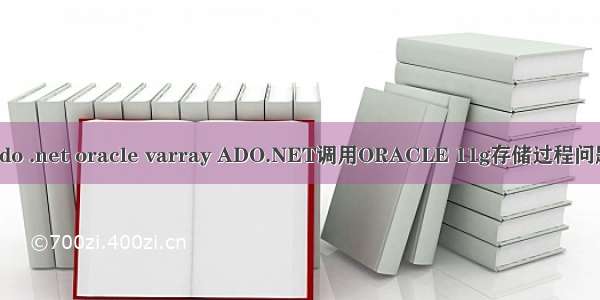
ORACLE中使用VARRAY解决字符串数组问题
博客分类:ORACLE/MYSQL总结OracleSQLJDBCCC++
如何从 PL/SQL 存储函数中返回数组类型
思路:在 Oracle 数据库中创建VARRAY,在Java Application中使用oracle.sql.ARRAY类 访问VARRAY
VARRAY是大小可变的数组。它具有数据元素的排列集,并且所有元素属于同一数据类型。每个元素都具有索引,VARRAY中元素的数量是VARRAY的“大小”。在声明VARRAY类型时,必须指定其最大值。
例如:PL/SQL 存储函数从SCOTT模式的EMP表中取出所有雇员的姓名,以这些姓名创建一个数组并将其返回。在 Java 应用程序中调用此 PL/SQL 存储函数,显示雇员的姓名。
打开PL/SQL客户端,建立如下的数组类型和存储函数:
SQL>CREATE OR REPLACE TYPE EMPARRAY is VARRAY(20) OF VARCHAR2(30)
SQL>/
然后创建下面的函数,它返回一个VARRAY。
Pl/sql代码
CREATEORREPLACEFUNCTIONgetEmpArrayRETURNEMPARRAYASl_dataEmpArray:=EmpArray();CURSORc_empISSELECTenameFROMEMP;BEGINFORemp_recINc_empLOOPl_data.extend;l_data(l_data.count):=emp_rec.ename;ENDLOOP;RETURNl_data;END;
在数据库中创建函数后,可以从 java 应用程序调用它并在应用程序中获取数组数据。下面给出Java 应用程序代码:
Java代码
importjava.sql.Connection;importjava.sql.DriverManager;importoracle.jdbc.OracleCallableStatement;importoracle.jdbc.OracleTypes;importoracle.sql.ARRAY;importjava.sql.SQLException;publicclassSPArrayAccess{publicstaticvoidmain(String[]args){Connectionconn=null;OracleCallableStatementstmt=null;try{DriverManager.registerDriver(neworacle.jdbc.driver.OracleDriver());conn=DriverManager.getConnection("jdbc:oracle:thin:@insn104a:1522:ora9idb","scott","tiger");stmt=(OracleCallableStatement)conn.prepareCall("begin?:=getEMpArray;end;");//Thenameweusebelow,EMPARRAY,hastomatchthenameofthe//typedefinedinSQLstmt.registerOutParameter(1,OracleTypes.ARRAY,"EMPARRAY");stmt.executeUpdate();//GettheARRAYobjectandprintsomemetadataaboutitARRAYsimpleArray=stmt.getARRAY(1);System.out.println("Arrayisoftype"+simpleArray.getSQLTypeName());System.out.println("Arrayelementisoftypecode"+simpleArray.getBaseType());System.out.println("Arrayisoflength"+simpleArray.length());//PrintthecontentsofthearrayString[]values=(String[])simpleArray.getArray();for(inti=0;i<values.length;i++)System.out.println("row"+i+"='"+values[i]+"'");}catch(SQLExceptionse){System.out.println(se.toString());}catch(Exceptione){System.out.println(e.toString());}finally{try{stmt.close();conn.close();}catch(SQLExceptionse){System.out.println(se.toString());}}}}
需要JDBC 驱动,Version 9i以上就可以了。
OracleCallableSatatement用于调用 PL/SQL 存储函数。在执行 PL/SQL 存储函数前,将返回的数据类型注册为OracleTypes.ARRAY,并且指定了在数据库中定义的数据类型名称 (EMPARRAY)。执行 PL/SQL 存储函数后获得oracle.sql.ARRAY类型的返回值。oracle.sql.ARRAY类拥有的方法可以获得一系列关于数组的详细信息,如数组类型TYPE、数组长度LENGTH等。这里我们使用oracle.sql.ARRAY的getArray()方法获得数组并将其打印出来。
Python正确的学习路线,你一定不知道的薪资翻倍秘
如何从8K提至20K月薪,你要掌握学习那些技能
分享到:
递归与分治策略(一):推卸责任是不对的|JAVA实现简易的邮件客户端程序
-12-11 00:51浏览 5530评论(0)分类:数据库查看更多
/blog/546032
/pls/asktom/f?p=100:11:::::P11_QUESTION_ID:331217279811
Ask TOM
FeedbackSign InQuestionscurrentOffice HoursResourcesAboutQuestions
return resultset as an array from function
Announcement
The AskTOM team is taking a break over the holiday season. Thanks for being a member of the AskTOM community. Have a safe and happy time during this period, and we'll see you all in !
Question and Answer
Thanks for the question, Lara.
Asked: June 20, 2000 - 10:10 pm UTC
Answered by: Tom Kyte - Last updated: February 11, - 10:12 pm UTC
Category: Database - Version: 8.1.5
Viewed 10K+ times! This question is
Whilst you are here, check out some content from the AskTom team:Sharing a tablespace between 2 databases
Latest Followup
You Asked
I want to return a resultset from a function. I saw your example on how to return it as a ref-cursor, but I need to return it as an array and then retreive the array in Java. Do you have an example of this?
Thanks,
Lara
and we said...
Well, jdbc can deal with result sets from stored procedures -- it would be easiest to do the result set in virtually EVERY case. You can do it as an Array, you must use Oracle8i object types to do this.
The java code to retrieve an array can look like this (comments contain the sql you need to run before executing the java)
import java.sql.*;
import oracle.jdbc.driver.*;
import oracle.sql.*;
// create or replace type SimpleArray
// as table of varchar2(30)
// /
//
// create or replace function getSimpleArray
// return SimpleArray
// as
// l_data simpleArray := simpleArray();
// begin
// for i in 1 .. 10 loop
// l_data.extend;
// l_data(l_data.count) := 'entry ' || i;
// end loop;
// return l_data;
// end;
// /
class Array
{
public static void main(String args[]) throws Exception
{
DriverManager.registerDriver
(new oracle.jdbc.driver.OracleDriver());
Connection conn =
DriverManager.getConnection
("jdbc:oracle:thin:@aria:1521:ora8i",
"scott",
"tiger");
OracleCallableStatement stmt =
(OracleCallableStatement)conn.prepareCall
( "begin ? := getSimpleArray; end;" );
stmt.registerOutParameter( 1,
OracleTypes.ARRAY,
"SIMPLEARRAY" );
stmt.executeUpdate();
ARRAY simpleArray = stmt.getARRAY(1);
System.out.println ("Array is of type " +
simpleArray.getSQLTypeName());
System.out.println ("Array element is of type code " +
simpleArray.getBaseType());
System.out.println ("Array is of length " +
simpleArray.length());
String[] values = (String[])simpleArray.getArray();
for( int i = 0; i < values.length; i++ )
System.out.println( "row " + i + " = '" +
values[i] + "'" );
stmt.close();
conn.close();
}
}
that routine for example prints out this:
$ java Array
Array is of type SCOTT.SIMPLEARRAY
Array element is of type code 1
Array is of length 10
row 0 = 'entry 1'
row 1 = 'entry 2'
row 2 = 'entry 3'
row 3 = 'entry 4'
row 4 = 'entry 5'
row 5 = 'entry 6'
row 6 = 'entry 7'
row 7 = 'entry 8'
row 8 = 'entry 9'
row 9 = 'entry 10'
For additional information on this feature, please see
</code>/docs/cd/F49540_01/DOC/java.815/a64685/oraext7.htm#1040060<code>
which is the jdbc manual, section on "Working with Arrays"
and you rated our response
(18 ratings)
Is this answer out of date? If it is, please let us know via a Review
Reviews
Nice!
April 04, 2001 - 9:30 am UTC
Reviewer: Mihai Manuta from Paris
Its one of the most unanswered questions in the forums. Unfortunately your answer raised another question: when I do the following:
cstmt=(OracleCallableStatement)conn.prepareCall("{call test(?,?)}");
cstmt.setObject(1,new String("ceva"),java.sql.Types.VARCHAR);
cstmt.registerOutParameter((2,OracleTypes.ARRAY,"PKG_DATATYPES.TV20");
cstmt.execute();
I get an exception:
Fail to construct descriptor: Unable to resolve type: "PKG_DATATYPES.TV20"
The PKG_DATATYPES.TV20 type is declared in the database (but wasnt declared by me). Can you help me on that?
May 27, 2001 - 10:23 pm UTC
Reviewer: Wai from Hong Kong
array passwing between java client & stored procedure
May 27, 2001 - 10:25 pm UTC
Reviewer: Wai from Hong Kong
The example is good because the
code is simple and it worked (for 8.1.x only).
Unfortunately, when I apply the sample code to
8.0.4 database. I got the similar
result as "Mihai Manuta from Paris" have
(unable to resolve type).
Then I downloaded the most recent
Oracle thin client driver (use 8.1.7
driver conntecting to 8.0.4 database),
the program overcome the resolve type problem.
However it introduce another problem againt,
the result is in Hexdecimal format instead of
ASCII string!!!
Is there any special setting require at
both database server/java client level?
How ARRAY type can be used using 8.0.5 JDBC driver?
July 16, 2001 - 7:16 am UTC
Reviewer: Avijit Saha from Kolkata, INDIA
Without changing JDBC 8.0.x driver how can I use ARRAY type? Now I'm working with Oracle client version 8.0.6 and JDBC version is 8.0.5 ( e.g. DatabaseMetaData meta = conn.getMetaData ();
System.out.println("JDBC driver version is " + meta.getDriverVersion()); ). Without using 8.1.x JDBC driver how can I get PL/SQL table as ARRAY type? Can any body help me?
July 23, 2002 - 8:46 am UTC
Reviewer: A reader
The array in the example is a simple array of table type varchar2(). what about a complex array..say String[][]
How would you go about it.
Followup
July 23, 2002 - 10:46 am UTC
two dimensional arrays are not supported until 9i (and string[][] is a 2 dim array) then they would map to a complex object type and you would use jpub to create a mapping class cause the code gets really ugly.
Read about jpublisher.
July 24, 2002 - 12:19 am UTC
Reviewer: A reader from Frankfurt
Does that mean 2 Dim arrays cannot be passed by a java stored proc/function in 8i. Is there a work around.
Followup
July 24, 2002 - 9:55 pm UTC
since everything has to go through the SQL layer and in 8i there is no such thing as an array of arrays -- yes, you are correct, there is no way to do it.
You must pass single dimensioned arrays OR use remote procedure calls (RMI over IIOP).
see
</code>/docs/cd/A87860_01/doc/java.817/a83728/04jserv2.htm#1007944<code>
(but not recommended)
July 26, 2002 - 4:12 am UTC
Reviewer: ossie j
so if 9i supports double dimensional arrays, is there any documentation or any sample program which demonstrates this, particularly in java egsample.
Followup
July 26, 2002 - 6:48 am UTC
yes, the plsql guide shows collections of collections and you'll want to use jpublisher to create the java mapping class.
How to Receive Arrays from Java in PL/SQL
February 07, - 9:02 am UTC
Reviewer: Chandra S.Reddy from India
Hi Tom,
I have one oustanding issue reg passing this arrays from Java to PL/SQL.
Am using Weblogic and Tomcat as application servers.So we obviously their(WL or Tomcat) connection pools.But not Oracle pool.
Plese look at the code below.
drop table t1 ;
create table t1 (a number(1), b varchar2(5));
drop type Num_List ;
create TYPE Num_List as TABLE OF NUMBER; -- create array of number
/
CREATE OR REPLACE PROCEDURE SP_PoC_Test_Array (in_val Num_List) IS
BEGIN
FORALL i IN in_val.FIRST..in_val.LAST
INSERT INTO T1 (A) VALUES (in_val(i)) ;
END SP_PoC_Test_Array;
/
-- Java program.
import java.sql.*; import oracle.jdbc.driver.*; import oracle.sql.*;import oracle.jdbc.oracore.Util;import java.math.BigDecimal;
public class ArrayTest1
{
public static void main (String args [])
throws SQLException, ClassNotFoundException
{
String driver_class = "oracle.jdbc.driver.OracleDriver";
String connect_string = "jdbc:oracle:thin:@spindc4:1521:java1";
Connection conn;
Class.forName(driver_class);
conn = DriverManager.getConnection(connect_string, "chandra", "chandra");
CallableStatement cstmt = conn.prepareCall("{CALL sp_cmsa_test_array(?)}");
int elements[] = { 1, 2, 3, 4, 5 };
ArrayDescriptor desc = ArrayDescriptor.createDescriptor("NUM_LIST", conn);
ARRAY newArray = new ARRAY(desc, conn, elements);
((OraclePreparedStatement)cstmt).setARRAY(1, newArray);
cstmt.execute();
cstmt.close();
}
}
The above implementations are working fine, when we tested as a standalone programs.
But, while developing the application, we should use Weblogic connection or Tomcat connection. Not Oracle driver.
In the above code "ArrayDescriptor" object is Oracle's own implementation(correct if am wrong).
There actually we are landing into errors.
Is there anyway to overcome this.
Shall we do this Java SPs or any other kind.
Another restriction, we have is there should not be any SQL, PL/SQL work inside in Java.Everything must be inside Stored procs.
*******
Corrently we are implementing this issue like below.
TYPE t_Roles IS TABLE OF NUMBER(3) INDEX BY BINARY_INTEGER; -- declare collection element for Ids and Flags.
v_Roles t_Roles ;
v_Indx := 0;
LOOP
v_Indx := v_Indx+1;
v_Position := INSTR(v_AllRoles, '~'); -- find position of delimiter (tild character). if string has any value, at least one delimiter is always there with it.
EXIT WHEN v_Position = 0 ; -- exit loop when delimiter not found
v_Roles(v_Indx) := TO_NUMBER(SUBSTR(v_AllRoles, 1, v_Position - 1)) ; -- take string before the position of delimiter
v_AllRoles := SUBSTR(v_AllRoles, v_Position + 1) ; -- reassign remaining string to same variable
END LOOP ;
-- more code here---
Where "v_AllRoles" is an IN parameter. I get values for this from application with '~' as a delimeter(ex:- '1~2~3~4~0'). In PL/SQL I tokenize the string(v_AllRoles) and construct an array v_Roles as in the above code.
And use the the "v_Roles" to do other transactions.
This kind of IN strings(~ delimited strings)are 'n' in number some times. Then I need to add 'n' number of loops.Finally Code looks very ugly.
Please suggest us.
Followup
February 07, - 12:20 pm UTC
array's are proprietary -- if a database has them, they are implemented in their fashion.
jdbc is "open" -- meaning the spec only defines that which is at the lowest common denominator.
We have extensions in our jdbc driver to allow you to use all of our functionality.
They do not.
Now, that aside:
...But, while developing the application, we should use Weblogic connection or
Tomcat connection. Not Oracle driver....
is something I don't agree with -- you don't have to, you are free to use OUR driver if you like. No reason you shouldn't -- especially if you use this construct alot.
nested table of object type as parameter to proc
April 10, - 4:55 am UTC
Reviewer: A reader
if i have a nested table of an object type can i map that to java?
meaning:
create type test_obj as object
(col1 varchar2(10),col2 number,col3 number);
create type test_tbl as table of test_obj;
can java use this test_tbl for mapping?
or is this considered as a two dimensional array?
how do i handle such situaions?
Followup
April 10, - 8:05 am UTC
Yes you can -- jpublisher is useful for doing so as it writes the code for you.
</code>/docs/cd/B10501_01/nav/docindex.htm#index-JPU<code>
Returning a pl/sql table from a procedure and function
September 17, - 11:43 pm UTC
Reviewer: A reader
Returning a pl/sql table from a procedure and function, i.e. the solution you gave above in pl/sql
Can you give a simple example for the above.
returning a result set....The best way
December 24, - 12:04 pm UTC
Reviewer: Dan White from Philadelphia, PA USA
Tom,
From what I have read there are 2 possible ways of returning result sets from Oracle stored procedures to Java(ref cursors and Arrays)(oracle 8.1.7.4). We are having an enternal debate at my client about the best way to go about this. We need to return multiple columns of data with multiple rows. We (java and Oracle Developers) would like to use ref cursors to return data due to the dynamic nature of our application. The DBA's here would like us to use arrays(nested table) to pass information back to the java client. there reasoning is that if the connection to the webserver is lost then there will be an open cursor left. If a session is activly retrieving data from a webserver and the connection to that server is lost what will happen to the session?
Followup
December 24, - 1:35 pm UTC
there is only one way to return a result set -- ref cursor.
to return an array is to return an array (no result set semantics about it).
The DBA's would rather you use scads of memory? To be really inefficient. The only correct method is a ref cursor, really ( wrote about this in my new book Effective Oracle By Design and showed the reasons you don't want to consider the arrays -- its ugly ).
How would there be any open cursors? they are worried about something that isn't going to happen. Say the browser crashes -- the jsp or whatever finishes and wah-lah, gives up the connection and all cursors would be closed.
Say the connection from the app server to the db is lost. Well, thats what DCD (dead client detection) will handle, database will clean up.
A lost connection will not result in open cursors lying about (and even if they do, so what? cursors are session specific -- the session would be left open -- no one else would be able to get to that session -- THAT is the problem they want to focus on and it is a problem you have with both techniques.
The only way to do this is a ref cursor.
Tom Execelent answer
December 29, - 1:15 pm UTC
Reviewer: Dan White from Philadelphia PA USA
Tom,
Thank you for the Answer, This is exactally what I have been trying to get across to our DBA staff.
Thank you
Dan
correct answer for Wai
November 19, - 5:21 am UTC
Reviewer: xiewen from Tibet, China
/*
drop table varray_table;
drop type num_varray;
CREATE TYPE num_varray AS VARRAY(10) OF VARCHAR2(12)
/
CREATE TABLE varray_table (col1 num_varray);
INSERT INTO varray_table VALUES (num_varray('你好', 'abc'));
select * from varray_table;
*/
import java.sql.*;
import java.math.*;
import oracle.jdbc.driver.*;
import oracle.sql.*;
class Array1
{
public static void main(String args[]) throws Exception
{
int oracleId = CharacterSet.ZHS16GBK_CHARSET;
CharacterSet dbCharset = CharacterSet.make(oracleId);
DriverManager.registerDriver
(new oracle.jdbc.driver.OracleDriver());
Connection conn =
DriverManager.getConnection
("jdbc:oracle:thin:@10.9.200.58:1521:db01",
"mytest",
"mytest");
Statement stmt = conn.createStatement();
ResultSet rs = stmt.executeQuery("SELECT * FROM varray_table");
while (rs.next()) {
ARRAY my_array = ((OracleResultSet)rs).getARRAY(1);
// return the SQL type names, integer codes,
// and lengths of the columns
System.out.println ("Array is of type " + my_array.getSQLTypeName());
System.out.println ("Array element is of typecode " + my_array.getBaseType());
System.out.println ("Array is of length " + my_array.length());
// get Array elements
String[] values = (String[]) my_array.getArray();
for (int i = 0; i < values.length; i++)
{
oracle.sql.CHAR out_value = new oracle.sql.CHAR(values[i], dbCharset);
System.out.println(">> index " + i + " = " + out_value);
}
}
rs.close();
stmt.close();
conn.close();
}
}
Resultset is passing to the Array
May 18, - 12:08 am UTC
Reviewer: Ramesh Battineni from India
Hello,
It's very usefull for me because I want to take the Resultset Data and store it in to an array, then that array need to paas in to the JTable Objects.
returning Incorrect type code
February 10, - 2:51 am UTC
Reviewer: Anup Toshniwal from London
Hi,
I have executed the same code ( passing Oracle Array to Java) as above using JDK 1.4 and Oracle 8i,but the java Array returns me type code 12 (varchar) instead of 1 (char), and this returns me values just like this (? ? ?) for every row of the Array. Not able to find out what they problem is and am not able to change the type code so that it returns the data in correct format. I suspect it is either the problem with either the JDBC library (ojdbc14.jar ) or the oracle 8i installation/options. We have also tested the above code with a 8i, jdk1.2, classes12.zip environment, but it still returns code 12.
Can you please guide as to what are the areas to be looked and how do we resolve for returning type code 1.
Regards,
Anup
Followup
February 11, - 10:12 pm UTC
well, that is what this code was first written with.
so, did you run *my* code or *your* code.
Perhaps your code was not correct code?
To: Anup Toshniwal re: returning Incorrect type code
February 12, - 2:36 am UTC
Reviewer: Stew Ashton from Paris, France
I'm not at work so I can't test this, but you might try using orai18n.jar in addition to ojdbc14.jar. It provides NLS support.
/technology/software/tech/java/sqlj_jdbc/htdocs/jdbc_10201.html
February 13, - 7:41 am UTC
Reviewer: haaseg from Germany
We also started using the JDBC Array interface mapped by Oracle to object relational data.This is a good solution to provide data into procedures.But we changed to use the PL/SQL PIPE ROW machanism and sql table operator to read data from stored procedures.See/reference/pipelined.htmlfor an example.There are many advantages using PIPE ROW:1. you can read the data via the standard JDBC/resultset interface without using oracle specific extensions.2. You don't have to overload the procedure when attributes are added to the result and you want to be backward compatible.3. it needs less resources for large arrays because it is piped.4. Personal performance tests show that the time need is comparable to ref cursors (of cause the fastet solution) and the array interface.
orai18n.jar does the job for NLS support
February 14, - 10:14 am UTC
Reviewer: Anup Toshniwal from UK
Hi everyone,Thanks to everyone for their suggestions, but hearty thanks to Stew for his advise on the query raised by me. The code is really working fine now giving desired results after using orai18n.jar along with ojdbc14.jar. This has been tested with a jdk1.4 , oracle 8i environment on Unix, so should work fine with further release combinations. Regards,Anup
/pls/asktom/f?p=100:11:::::P11_QUESTION_ID:331217279811














![[06月]跳皮筋作文700字](https://700zi.400zi.cn/uploadfile/img/2024/06/11/5d6569f8c6ebae1ce134fe4ddcfec138.jpg)

